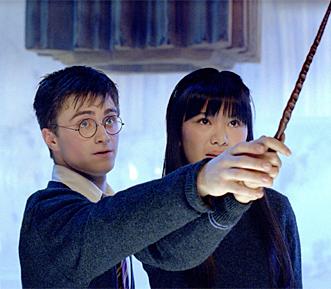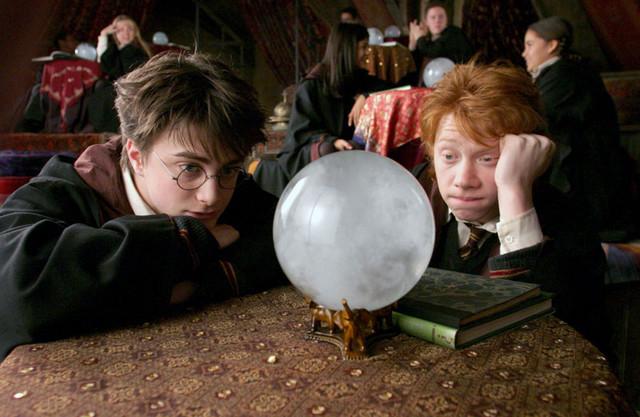 The end of Part I left off when I, onetime vicious detractor of Harry Potter, went to the library and checked out Harry Potter and the Sorcerer’s Stone. I wanted to read the series for myself, to understand whether my former opinions were true, as well as to scope out what made the bestselling books so popular. Although my intent was to analyze the story, I also wanted to be open to the possibility of enjoying it – even really enjoying it! I was open to the idea that I might be entirely wrong and have to recant my previous stance.
The end of Part I left off when I, onetime vicious detractor of Harry Potter, went to the library and checked out Harry Potter and the Sorcerer’s Stone. I wanted to read the series for myself, to understand whether my former opinions were true, as well as to scope out what made the bestselling books so popular. Although my intent was to analyze the story, I also wanted to be open to the possibility of enjoying it – even really enjoying it! I was open to the idea that I might be entirely wrong and have to recant my previous stance.
So I began to read.
And The Result Was…
I enjoyed them immensely! There were so many elements about the series that I loved!
- A very engaging world with oodles of fantastic details.
- Quirky, amusing characters.
- Strong friendships.
- Sacrifice.
- A school for children with special abilities (I love the X-Men series for this same reason – special schools delight my imagination for some reason!).
- Entertaining, well-written prose.
- A reasonable balance between fun shenanigans and dark danger – the first few books more so than the later ones, which are admittedly more dark.
- Copious amounts of OWLS!! (They are my favorite animal ever, and the only reason I had any small desire to read the series as a young teen.)
In short, no wonder these books are so popular! They’re a lot of fun! The Wizarding World draws you right in, and Rowling thought out the plot and world so well. She is definitely one of my favorite authors, and Harry Potter has taken its place among my favorite books and movies. I am sorry I didn’t explore the series sooner.
Some things I didn’t like so much:
- While the main characters are close, loyal friends, they frequently have “falling-outs” that last for days, weeks, even entire terms, often over simple misunderstandings or petty arguments. Seriously? They were so childish and silly sometimes, even as they got older. One of my favorite aspects of the story is the friendship between Harry, Ron, and Hermione, and it bugged me every time their camaraderie was disrupted for another spat.
- The teen romance. Ugh. I feel like the story would be much stronger without all the angst, awkward first kisses, and who-likes-who. After the first couple of volumes, three or four of the middle books were slathered in teen crushes, and found it distracting and irritating. It also contributed to a lot of the “falling out”.

Like this. Groan.
I guess what bugged me was the teenybopper social life that is inevitable when you put a bunch of preteens/teens together in a cliquey private school. Maybe it’s because I read it as a 20-year-old instead of a 12-year-old, or maybe it’s because I was a homeschool graduate and never experienced that kind of environment myself. But I suppose I can understand why Rowling would include those elements, as many young people today have vacillating school friendships and angst-ridden crushes. I just personally found it detracted from the wonder of the story.
The Magic
At first I was wary of the magical content, and tiptoed gingerly through the halls of Hogwarts. The magic is mostly fluffy, harmless, silly stuff, not much different than you might find in a fairy tale, and certainly nothing like witchcraft as Scripture describes it. It’s more like a useful technology that only the wizards can use, by route of wands, words, and mental power. I find it, for example, far less pervasive and dangerous than the Force in Star Wars – which I actually find more objectionable from a worldview standpoint. It’s the classic good powers vs. evil powers scenario, found equally in fairy tales, Star Wars, and superhero yarns. With a few rare exceptions (Divination Class…), little in Harry Potter reminds me of real-life Wiccans, pagan witchcraft, or Biblical sorcery.

Divination, a very real activity and condemned in the Bible, comes up once or twice in the story, but it is largely viewed as an unreliable and silly practice by the Hogwarts students and faculty.
Although the magic is mostly imaginative, I feel that the way it is presented is “closer” to real-life magic than books such as The Chronicles of Narnia or The Lord of the Rings. While I wouldn’t be concerned if I found my child pretending to speak Elvish to a wall to make a door appear, I would definitely pull them aside for a talk if I found them pretending to cast spells on the neighbor kid. There is something more tangible about the Harry Potter magic that gives me pause and should be handled with a bit more caution, in my opinion.
In Conclusion
Having read and watched the Harry Potter series for myself, I love the stories very much. If you’ve avoided them on account of the magic, but you’re okay with Narnia, Middle-Earth, and other classic fantasy, I highly recommend you take a peek as I did!
However, I retain my original stance that I would not give the books to very young children. The magic, while largely harmless, does have some elements of real-world witchcraft that very young readers might not be able to discern. With my own kids, I’d probably hold off until they’re around 10. Then I would read the books with them – partially so we could discuss any questionable elements of the story…and partially because I enjoyed them so much that I’ll want to read them all again. 🙂

[…] Read Part II here. […]
That’s just about exactly what my family did. (with me, at least. My siblings read the books younger. That’s what come of being the oldest. 🙂 I don’t mind though.) Only I was 11 when I started reading. 🙂
You know, neither of those issues bothered me too much. I wasn’t thrilled by Cho, certainly. And I felt the same about Lavender. But I think that (SPOILERS!!SPOILERS!!) Harry/Ginny at the end of the sixth and Ron/Hermione at the end of the seventh added to the story. As for their falling-outs, (I’m judging by siblings here) most ARE over simple misunderstandings. Or just plain being bugged by something for too long. Yes, they could have handled it better. But I’d be annoyed if someone else’s pet was trying to eat mine. The whole Firebolt incident is Hermione being Hermione. To Harry and Ron, she comes off at her bossiest, most interfering, the same as the beginning of the Sorcerer’s Stone. Harry and Ron are mad because it’s a FIREBOLT!!! Ron’s jealous in Goblet of Fire, and they won’t talk it out. But eventually do. Come to think of it, their worst disagreements are being influenced from the outside, pretty much by Voldemort. Scabbers isn’t really a rat. The Horcrux is sort of a weight. I’ve always thought of it as since it holds Voldemort’s soul (or a piece, that is) they become Voldemort’s conscience for a time. So they feel really guilty for everything he did, as if they had done it. That puts them in a bad mood and affects their abilities.
(AND…they end.)
I think my mom’s biggest issue with the book was actually how Satanic Voldemort is.
As for children reading Harry Potter playing it? My siblings and I used to play Harry Potter quite a bit. It wasn’t as much spells as pretending to be Ron, Harry, and Hermione on broomsticks or playing ball at the Weasleys’. My very little brother, after everyone else had read the series would pretend to be Crookshanks (He likes cats.) when we would play, just because everyone else was talking about it. Wand fighting led to too many arguments such as, “You’re supposed to be dead!” “No! You missed!” Uh, yeah. 🙂 Star Wars was much played as well. We used to explore caves a lot, (Why, not so sure) if I remember right. And we would track the bad guys, but had few battles. (The fun part was pretending to block blaster bolts. 🙂 ) We would also train to be Jedi. So we did play Harry Potter, and enjoy it, but the focus was more on the characters than the magic. While I agree with the thought behind you idea, your children may also want to play Harry Potter. Of course, if each is twelve, you might have less of that. All right, now I’m done rambling. 🙂
I agree, some of their disagreements do make sense, especially the part with the Horcrux.
I don’t have an issue with how satanic Voldemort is, because in a way he sort of represents Satan – not entirely, of course, but in a way. Satan IS a villain, so therefore it makes sense for a villain to be a little or a lot like him.